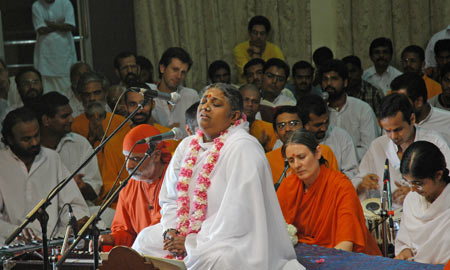15 September 2006 — Amritapuri
You will not find a more ecstatic bhajan than the one that takes place just after midnight in Amritapuri on Krishna Jayanti. These are not the heart-wrenching bhajans of separation, but happiness itself set to music. The melodies themselves burst at the seams with the gusto with which they are sung—and in fact the words are not really sung, but shouted. Four thousand pairs of hands keep the rhythm! Sadness in the presence of such music is simply not possible. Like darkness and light, they simply cannot share the same space.
Govinda gokul ayo!
Govinda gokul ayo!

The meaning is so simple: “Govinda has come to Gokul.” To read such a line on paper tells one nothing. The full meaning comes only through its rendering. Put a hundred exclamation points at the end of this line, and it still wouldn’t convey the joy expressed through it on Krishna Jayanti in Amritapuri. It is the joy only known to one whose life has been made full by the presence of a Satguru. The gopis of Vrindavan knew this joy 5,000 years ago, and the children of Amma know it today.
In her Krishna Jayanti message, Amma spoke of the bliss the Guru brings into our lives through a story wherein all the gopis cite the day Krishna came to Vrindavan as their birthday. “That was the day we truly started living,” the gopis said in the story. “Before meeting Krishna, there was such a void in our lives. But as soon as we had his darshan, our lives became beautiful.”
What a joy the Guru brings to our lives! In this modern world, where depression, negativity and dullness seem to claim more lives every year, so many people joining together to make such a joyous noise is truly a miracle. And, in fact, it is that very miracle that is being celebrated when Amma and her children sing these lines.
“Govinda comes to Gokul” means happiness itself is coming into our lives—through the sheer presence of the Guru and, furthermore, through the freedom wrought when the Guru’s teachings are put into practice and the knowledge therein is imbibed.
—Kannadi
